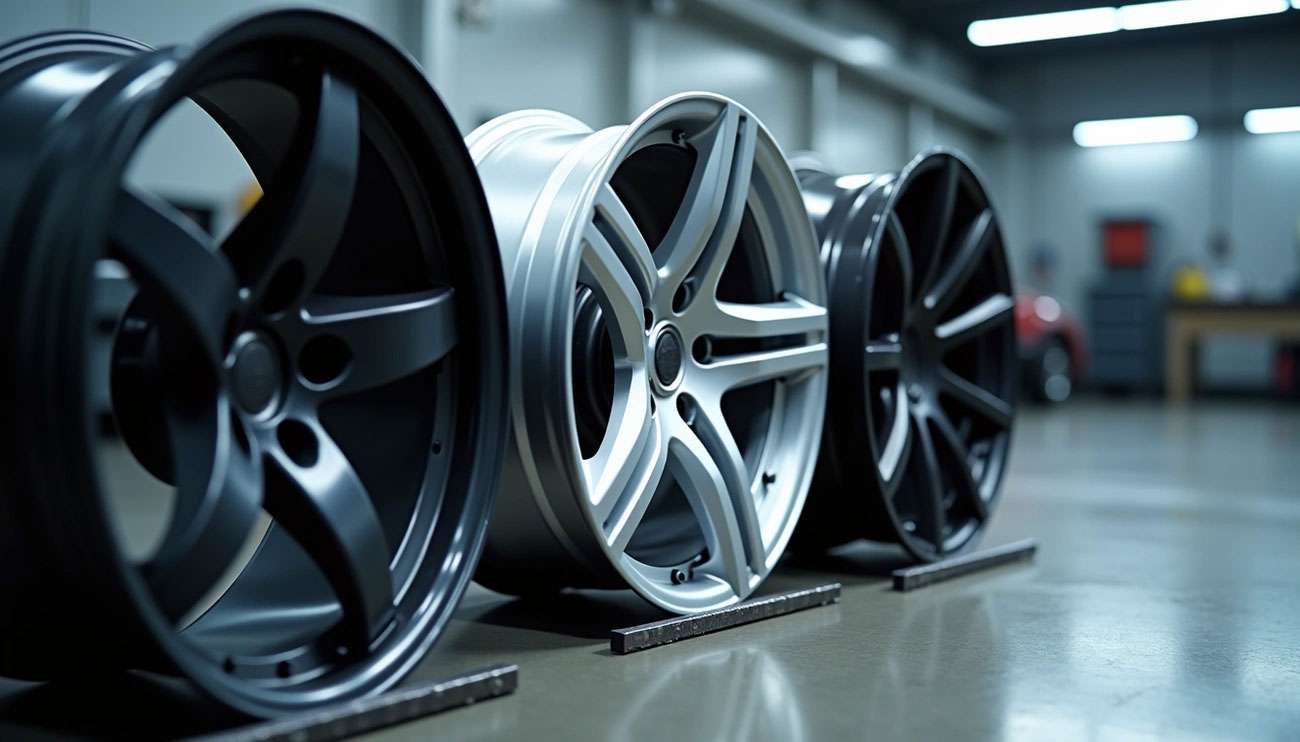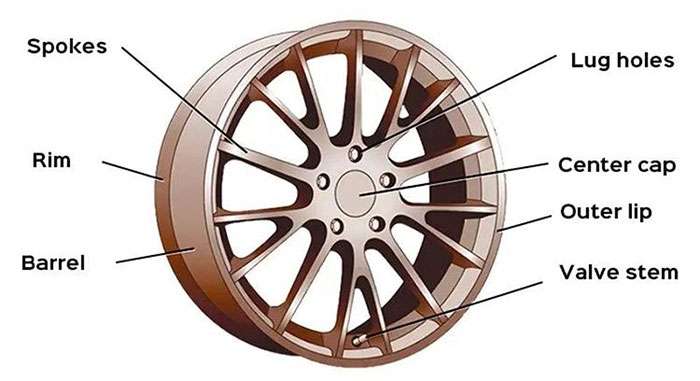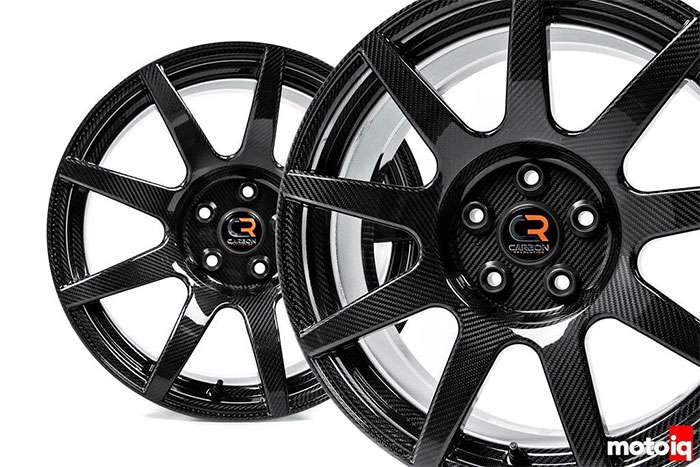
What are wheels made of? This question hits your budget directly. Steel wheels start as low as $50 per wheel, while premium materials on performance vehicles like the Corvette Z06 can reach an astonishing $13,500 for a set of four.
Material choice makes a real difference in both performance and appearance. Steel wheels remain popular in trucks and utility vehicles where strength and affordability matter most. Alloy wheels can reduce weight by up to 40% compared to steel, improving fuel economy and handling. From basic steel to aluminum alloys and exotic carbon fiber, wheel materials vary widely across vehicle types and price points. Steel wheels typically range from $50-$150 each, while aluminum wheels generally cost between $125-$500 per wheel, offering a balance of performance and value.
We'll walk you through what car wheels are made of today, examine the strengths and weaknesses of each material, and show you how manufacturing processes affect performance, appearance, and longevity. Whether you need budget-friendly durability or lightweight performance, this guide gives you the knowledge to make smart decisions about your vehicle's wheels.

Image Source: Automotive Prototype | Custom Auto Parts Manufacturing
Wheels consist of multiple interconnected components working together as a complete assembly. Understanding what wheels are made of starts with recognizing the distinction between wheels and rims - terms often mixed up in everyday conversation.
Wheels and rims are not the same thing, despite how most people use these terms. The wheel encompasses the entire metal structure that connects to your vehicle's hub through an axle. This complete assembly includes several key components: the hub (connecting to the axle), spokes (radiating outward from the hub), and the barrel (inner portion supporting the tire's shape).
The rim refers exclusively to the outermost circular part of the wheel. This U-shaped outer edge holds and secures the tire in place while creating an airtight seal. The rim includes specific elements like the rim flange (contacting the tire bead) and the barrel housing the drop center (essential for mounting tires).
The rim represents just one component within the [complete wheel assembly]. The wheel connects to your vehicle through the hub, which attaches to the axle via lug nuts, while the rim serves as the reinforcement edge securing the tire.
Modern car wheels use two primary materials: steel and aluminum alloy. Steel wheels, constructed from carbon steel, offer remarkable strength and durability. Created through a straightforward stamping process, these wheels cost significantly less, typically ranging from $50-100 per wheel. Their exceptional durability makes them ideal for heavy-duty vehicles and harsh winter conditions.
Aluminum alloy wheels dominate today's market. These wheels combine aluminum with other metals like magnesium, nickel, or silicon to enhance specific properties. They provide greater strength-to-weight ratio, improved heat conduction, and enhanced esthetic appeal compared to steel variants.
High-performance vehicles sometimes utilize more exotic materials:
Magnesium alloy wheels - extremely lightweight but prone to corrosion
Carbon fiber wheels - offering unparalleled strength-to-weight benefits
Titanium wheels - providing excellent corrosion resistance
The manufacturing process further differentiates wheel types, with cast wheels (molten aluminum poured into molds) being more affordable than forged wheels (compressed under high pressure).
Modern vehicles rely on two dominant materials for wheel construction: steel and aluminum alloy. Each material delivers distinct characteristics that influence performance, cost, and appearance. Understanding these differences helps you select the right wheels for your specific needs.
Steel wheels have earned their reputation through exceptional durability and strength. Manufactured through a straightforward stamping process, steel wheels can withstand extreme conditions without cracking or bending, making them ideal for off-road vehicles, work trucks, and harsh environments. Their remarkable resilience comes at a trade-off—a steel wheel typically weighs 2.5-3 times more than a comparable aluminum wheel.
This additional weight creates both advantages and drawbacks. During winter months, heavier steel wheels can provide better traction on snowy and icy roads. However, the increased mass negatively impacts acceleration, braking, and fuel economy.
Steel wheels remain the economical choice, costing approximately 70-80% less than alloy alternatives. Their simple design and ease of repair make them particularly appealing for budget-conscious drivers and fleet operators who prioritize functionality over style.
Aluminum alloy wheels combine aluminum with other metals like nickel, magnesium, or silicon to enhance specific properties. Their primary advantage lies in significantly reduced weight, which directly improves vehicle handling and performance. This weight reduction decreases unsprung mass, allowing for more precise steering input and improved cornering characteristics.
Aluminum alloy wheels dissipate heat more effectively than steel. This superior heat dissipation becomes crucial for vehicles making frequent stops, as it helps prevent brake fade and extends tire life by drawing heat away from these components.
Beyond performance benefits, aluminum wheels offer exceptional design flexibility. Their malleability allows for intricate spoke patterns and various finishes from chrome to matte black and even exotic colors. For those seeking custom wheels with exceptional style, check out Performance Plus Tire's extensive wheel collection featuring diverse designs and finishes.
Aluminum alloy wheels dominate the passenger vehicle market today. Most modern cars come equipped with aluminum alloys as standard equipment, particularly in mid-range and higher trim levels, while steel wheels typically appear on base models and commercial vehicles.
This market preference reflects aluminum's balanced combination of lightweight performance, corrosion resistance, and visual appeal. Although aluminum alloy wheels generally cost more initially, their benefits in fuel efficiency, brake performance, and reduced maintenance requirements often justify the investment for manufacturers and consumers alike.

Image Source: MotoIQ
High-performance vehicles now incorporate advanced wheel materials that push engineering boundaries. These specialized options deliver exceptional benefits at premium price points.
Carbon fiber wheels consist of carbon fibers woven together and bonded with resin, creating an incredibly strong yet lightweight composite material. These wheels offer an unmatched strength-to-weight ratio, weighing approximately 40% less than comparable aluminum wheels. This remarkable weight reduction directly improves vehicle dynamics by decreasing unsprung mass, consequently enhancing acceleration, handling, and braking efficiency.
A typical carbon fiber wheel costs approximately $5,000 compared to $2,500 for forged aluminum alternatives. The performance advantages justify this premium for many enthusiasts. Carbon fiber's exceptional stiffness enables more precise power transmission when cornering. Carbon fiber naturally dampens road vibrations, reducing driver fatigue on long journeys.
For those seeking maximum performance wheels with distinctive styling, Performance Plus Tire offers extensive options worth exploring.
Titanium wheels excel in extreme conditions thanks to their outstanding corrosion resistance. Titanium remains stable in seawater, wet chlorine, and organic chlorides that would typically cause pitting in steel. This exceptional durability results from titanium's self-healing oxide film that continuously forms when exposed to air and moisture.
Titanium possesses the highest strength-to-weight ratio among metals, making it ideal for performance applications. Titanium wheels remain relatively uncommon due to complex manufacturing processes—some manufacturers even utilize 3D printing techniques. Their prohibitive cost stems from titanium's expensive extraction process and limited availability.
Magnesium stands as the lightest structural metal available, being 1.5 times less dense than aluminum and 4.5 times less dense than steel. This extraordinary lightness translates to tangible benefits—magnesium wheels can reduce fuel consumption by up to 8% in urban conditions.
A key advantage of magnesium wheels lies in their superior damping properties, which exceed aluminum's by 50 times. This characteristic significantly reduces vehicle vibration, especially in critical components like suspension and transmission.
Magnesium's primary drawback involves its corrosion susceptibility. Modern magnesium wheels use alloy blends incorporating elements like aluminum to enhance corrosion resistance. Current applications focus primarily on high-performance vehicles where weight reduction remains paramount.
Manufacturing processes shape wheel performance beyond just material selection. The method used to form metal creates distinct structural properties that directly impact strength, weight, and durability.
Cast wheels are produced by pouring molten aluminum into a mold where it cools and hardens. This cost-effective process creates wheels that are affordable yet relatively heavy. Forged wheels start with a solid aluminum block that's heated and compressed under 8,000 to 10,000 tons of pressure. This compression aligns the metal's grain structure, eliminating porosity and creating a denser material.
The results speak for themselves—forged wheels typically weigh 10-20% less than comparable cast wheels. For an 18-inch wheel, measurements show cast wheels weigh about 11.2 kg while forged wheels weigh only 8.5 kg—a difference of 2.7 kg.
Flow-formed wheels offer a middle ground, starting as cast wheels before being heated and spun at high speeds while applying pressure to strengthen the barrel. These wheels approach forged-level performance at lower costs.
Carbon hybrid wheels combine lightweight carbon fiber with metals like aluminum or magnesium. Typically, the rim (barrel) is carbon fiber while the centerpiece is forged aluminum, joined using titanium fasteners. This combination reduces unsprung weight by up to 40% compared to cast aluminum wheels.
Looking for premium wheels with advanced manufacturing? Visit Performance Plus Tire for expert guidance.
Manufacturing directly affects both price and durability. Cast wheels typically cost $50-100 each, making them appealing for budget-conscious drivers. Forged wheels command premium prices because of their labor-intensive production but offer superior crack resistance. Instead of shattering like cast wheels, forged wheels tend to bend under extreme impacts, providing a safer failure mode.
The manufacturing process also determines heat dissipation capabilities. The aluminum in hybrid wheels acts as a heat sink, effectively drawing away brake heat—crucial for extending brake component life.
Wheel materials directly affect your driving experience, budget, and vehicle appearance. Steel wheels deliver exceptional durability and affordability, making them the smart choice for work trucks and winter conditions. Aluminum alloy wheels dominate the market for good reason—their lighter weight, superior heat dissipation, and stylish designs offer the best balance of performance and value.
Advanced materials serve specific purposes. Carbon fiber provides an unmatched strength-to-weight ratio for serious performance enthusiasts willing to pay premium prices. Titanium wheels excel in corrosion resistance but remain rare due to manufacturing complexity. Magnesium alloy wheels offer extreme weight savings and fuel economy benefits, though corrosion remains a concern.
Manufacturing processes create distinct performance characteristics. Cast wheels serve budget-conscious drivers well, while forged wheels deliver superior strength through their compressed grain structure. Flow-formed and composite options provide middle-ground alternatives that balance cost against performance.
When choosing wheels for your vehicle, look beyond appearance. Consider how wheel weight affects handling, acceleration, and fuel economy. The right material choice can enhance your driving experience while matching your vehicle's style.
Whether you need rugged durability, lightweight performance, or head-turning looks, understanding wheel materials helps you make decisions that fit your driving needs and budget. The investment in quality wheels pays off through improved performance, better fuel efficiency, and enhanced vehicle appearance.
Understanding wheel materials helps you make informed decisions that balance performance, cost, and durability for your specific driving needs.
• Steel wheels cost $50-150 each and offer exceptional durability, making them ideal for work trucks and harsh winter conditions despite being 2.5-3x heavier than aluminum.
• Aluminum alloy wheels dominate modern cars due to their 40% weight reduction compared to steel, improving fuel economy, handling, and heat dissipation.
• Advanced materials like carbon fiber can reduce wheel weight by 40% over aluminum but cost around $5,000 per wheel versus $2,500 for forged aluminum alternatives.
• Manufacturing processes significantly impact performance—forged wheels weigh 10-20% less than cast wheels and bend rather than shatter under extreme impacts.
• Material choice directly affects your wallet and driving experience, with costs ranging from $50 for basic steel to $13,500 for premium performance wheel sets.
The right wheel material transforms your vehicle's performance characteristics while reflecting your priorities between budget, esthetics, and driving dynamics.
The most common materials for modern car wheels are steel and aluminum alloy. Steel wheels are known for their durability and low cost, while aluminum alloy wheels are lighter, more stylish, and offer better performance.
Carbon fiber wheels offer an exceptional strength-to-weight ratio, being about 40% lighter than comparable aluminum wheels. They provide superior performance benefits but come at a much higher cost, typically around $5,000 per wheel.
Forged wheels are typically 10-20% lighter than cast wheels and offer superior strength. They have a denser structure due to the manufacturing process, which makes them more resistant to cracking and allows them to bend rather than shatter under extreme impacts.
The material of the wheel significantly impacts a vehicle's performance. Lighter materials like aluminum alloy or carbon fiber reduce unsprung mass, improving acceleration, handling, and fuel efficiency. They also dissipate heat better, which can enhance brake performance and tire longevity.
When selecting wheel materials, consider factors such as cost, weight, durability, performance needs, and esthetic preferences. Steel wheels are budget-friendly and durable, aluminum alloy offers a good balance of performance and style, while advanced materials like carbon fiber provide maximum performance at a premium price.